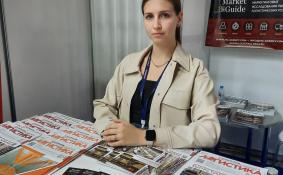
научно-практический
журнал

Новости редакции
Дорогие читатели! Представляем вашему вниманию первый номер журнала «ЛОГИСТИКА» в 2025 г. Прежде всего хотим обратить внимание читателей на нашего нового партнера R1 Development – девелоперскую компанию, которая создает среду нового поколения и специализируется на строительстве индустриально-логистической, коммерческой и жилой недвижимости. Один из проектов R1 Development – сеть индустриальных парков «Дружба».
Дорогие читатели! Представляем вашему вниманию заключительный номер журнала «ЛОГИСТИКА» в 2024 г. Мы постарались сделать его насыщенным и интересным.
Дорогие читатели! Представляем вашему вниманию 11-й номер журнала «ЛОГИСТИКА», где вы найдете актуальные материалы и статьи.
Статья недели:

ФОТО НЕДЕЛИ
ЦИТАТЫ
События в российской логистике
Populism, Trade Backlash Cloud Emerging Markets Picture
India stands out in annual logistics Index, but executives show concern about 2017
BAAR, Switzerland
Nearly 69% of logistics professionals say they worry about a retreat from free trade in 2017 following the UK’s Brexit vote and the collapse of global and regional trade talks, a new survey shows.
The survey of more than 800 global logistics and supply chain executives is part of the 2017 Agility Emerging Markets Logistics Index, an annual snapshot of industry sentiment and a ranking of the world’s 50 leading emerging markets by size, business conditions, infrastructure and transport connections.
A significant minority – 43% -- said the International Monetary Fund’s 2017 emerging markets growth forecast of 4.6% is too optimistic.
India was a standout in the survey and country rankings. Logistics professionals picked India as the emerging market with the most logistics potential and the country where their companies are most likely to invest. India climbed past United Arab Emirates to No. 2 in the Index after China.
2017 Index highlights:
• Twenty-four of the 50 countries – including seven of the top 10 -- experienced a year-over-year deterioration in their Index scores, reflecting stagnation in global trade growth and turbulence in emerging markets.
• China, the world’s second-largest economy, remains the world’s leading emerging market. In the survey, supply chain executives identified the direction of China’s economy as the factor most likely to drive global economic and trade growth in 2017. Seventy-six percent said China’s slowing economy is slowing, but only 17% said the slowdown is significantly hurting the transport and logistics sector. Sixty-six percent said lower growth will not alter their plans in China.
• Robust growth and long-anticipated tax and economic reform pushed India to No. 2 in the Index and impressed the logistics executives surveyed. Even so, India’s surprise decision to remove high-denomination bank notes from circulation and encourage cashless payments could be jarring for the economy in 2017.
• UAE, No. 3 overall in the Index, again topped the rankings in the areas of business climate, and in logistics infrastructure and transport connections. Gulf countries UAE, Qatar, Oman, Bahrain, Saudi Arabia and Kuwait claimed six of the top 10 spots for best business conditions.
• Iran climbed eight spots in the Index rankings to 18th overall and leaped to 9th from No. 15 among emerging markets countries that executives view as having the most potential to grow as logistics markets. Iran’s gains were the biggest of any country in the Index or the survey.
• Africa’s biggest economies – Nigeria and South Africa – were among the countries that fell most sharply in the Index. Smaller African markets – Uganda, Ethiopia, Tanzania and Kenya – improved their rankings in 2017.
• Brazil held its No. 7 Index ranking despite a painful recession and the impeachment of President Dilma Rousseff. In the survey, logistics executives again picked Brazil as the the market with the most logistics potential after India and China. One reason for their optimism: nearly 57% expect commodity prices to rebound in 2017, although most do not expect significant increases.
• Bahrain jumped five spots in the latest Index to No. 23 after years of social unrest that hurt its ranking. Argentina, attempting to end years of international economic isolation, climbed three places to No. 28. Kazakhstan shot up four spots to No. 14, largely on the strength of business conditions that ranked behind only those of four Gulf countries – UAE, Qatar, Oman and Bahrain.
• Turkey weathered the effects of an attempted coup and extremist violence, moving from 10th to No. 9 in the latest Index. Russia fell from 9th to No. 10, a modest slip suggesting that has contained the fallout from Western economic sanctions and low energy prices.
The Index, in its eighth year, ranks emerging markets countries by factors that make them attractive to logistics providers, freight forwarders, shipping lines, air cargo carriers and distributors.
Essa Al-Saleh, CEO of Agility Global Integrated Logistics, said logistics providers and their customers are concerned that anti-globalization feeling and populist policies in the UK and United States could spread and harm trade in emerging markets that rely heavily on exports.
“Emerging markets continue to deliver the highest growth rates in the world, but as links in the global supply chain, countries can be extremely hard to evaluate,” Al-Saleh said. “The Index and the survey are useful when it comes to identifying the relative strengths and weaknesses of individual markets.”
Transport Intelligence (Ti), a leading analysis and research firm for the logistics industry, compiled the Index.
John Manners-Bell, Chief Executive of Ti, said: “Uncertainty and volatility have characterized many emerging markets in 2016. This has been compounded by the political environment in Europe and the U.S., which will have direct consequences on trade with Latin America, Asia and Africa. However there have been many positives too -- for example, the strong performance of India. More than ever, the Index identifies and contrasts those markets which will prosper from the most vulnerable and poorest performing.”




















